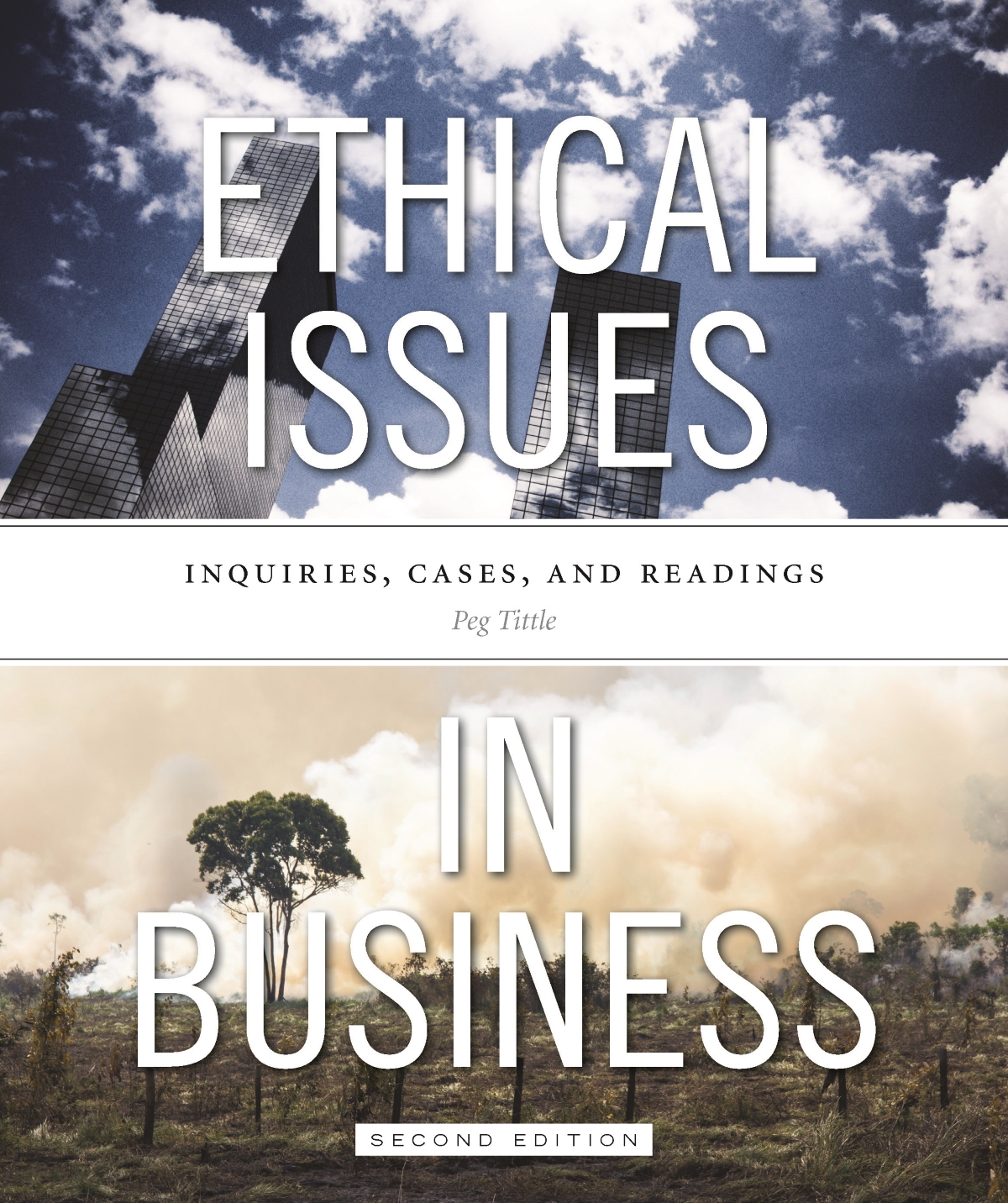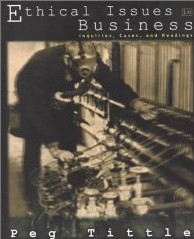Ethical Issues in Business: Inquiries, Cases, and Readings – 2nd Edition
Broadview Press 2016
Peg Tittle’s ambitious business ethics text brings together readings, cases, and the author’s own informed opinions. The second edition includes over a dozen new readings and case studies, as well as a new chapter on issues in Information and Communication Technology.
Includes:
- Canonical and topical readings on issues ranging from whistleblowing and advertising to international business, the nature of capitalism, and the environment
- Engaging overviews from the author encourage careful reflection and critical examination of conventional assumptions
- What to Do? scenarios and Case Studies illustrate the practical relevance of each topic
- Comprehensive introductions to ethical theory and the ethics of business.
- Questions following each selection test understanding and promote active reading
- A primer on ethical institutions examines the role of ethics consultants, codes of ethics, and more.
Click here to read the Introduction to the chapter on Business and the Environment.
Available in print, at Amazon, Chapters/Indigo, Book Depository, Bookshop, and quite possibly wherever you buy your books online.
“Ethical Issues in Business is clear and user-friendly yet still rigorous throughout. It offers excellent coverage of basic ethical theory, critical thinking, and many contemporary issues such as whistleblowing, corporate social responsibility, and climate change. Tittle’s approach is not to tell students what to think but rather to get them to think—and to give them the tools to do so. This is the text I would pick for a business ethics course.” Kent Peacock, University of Lethbridge
“This is a well-constructed text. It covers important topics in business ethics with academic rigour yet succeeds in making the material accessible.” Robert Larmer, University of New Brunswick
Ethical Issues in Business: Inquiries, Cases, and Readings
Broadview Press 2000
The core of this text comprises chapters on all the key issues of business in Canada today. Each chapter includes a hypothetical case study and an introduction highlighting key ethical points; two academic essays; and a real-life case study. Questions for discussion accompany the essays and case studies. The author has also included a general introduction to ethical issues and an overview of ethical theory; a section on institutionalizing ethics (discussing ethics officers/programs/codes etc.); and appendices providing excerpts from important classic contributions to ethical theory and from relevant Canadian law.
Available in print, at Amazon, Chapters/Indigo, Book Depository, Bookshop, and quite possibly wherever you buy your books online.
The core of this text comprises chapters on all the key issues of business in Canada today. Each chapter includes a hypothetical case study and an introduction by the editor highlighting key ethical points; two academic essays; and a real-life case study. Questions for discussion accompany the essays and case studies. The editor has also included a general introduction to ethical theory; a section on institutionalizing ethics (discussing ethics officers/programs/codes, etc.); and appendices providing excerpts from important classic contributions to ethical theory and relevant Canadian law. The result is a comprehensive and useable course text particularly helpful for Canadian students. Society for Business Ethics Newsletter
Ethical Issues in Business is a comprehensive package of articles, cases, and background discussion that provides an outstanding introduction to the subject for Canadian students. The text breathes fresh air into the study of business ethics; Tittle’s breezy, use-friendly style puts the lie to the impression that a business ethics text has to be boring. Paul Viminitz, University of Lethbridge
Any non-Canadians willing to overlook the exclusively Canadian origin of the case studies will find that the issues raised apply universally. More to the point, they will find themselves in possession of a superb introduction to ethics in business. Steve Deery, The Philosophers’ Magazine
Peg Tittle wants to make business students think about ethics. So she has published an extraordinarily useful book that teaches people to question and analyze key concepts.
Take profit, for example. Nothing in the pantheon of business topics is more central than profit.
“Most business students seem to assume that profit is good,” says Tittle, who teaches at Nipissing University’s Centre for Continuing Business Education.
Many assume the pursuit of profit is the reason for being in business. Some even assume it’s a right. But Tittle challenges Canada’s future business leaders to justify profit on ethical grounds.
Suppose you’re an upper-level manager of a company and you have a midlife crisis. You consider suggesting a profit ceiling to the board of directors.
Maybe by relaxing the bottom line, you can pay a fairer price to your suppliers or buy costlier but more environmentally responsible materials; maybe you can lower prices; maybe you can increase wages and benefits; maybe you can afford fringe programs now on the back burner.
Then, you begin to consider the possible downside of a profit ceiling.
Will investors buy your shares and brokers recommend the stock if your company has voluntarily limited its profit? Why settle for a 6 per cent rate of return when you can a get 7 or 8 per cent elsewhere?
As a senior executive of the company, you will be giving up the bonus you receive when profits are higher, money that helps fund extras that improve your family’s quality of life.
So, you reconsider. Maybe instead of limiting profits, you can use the profit the company makes to enhance its reputation and stability, and thus increase the level of job security for all employees.
The company can give part of after-tax profit to charities, worthy environmental projects or community recreation programs, or start a profit-sharing program with workers.
Does profit-sharing make high profits ore morally acceptable? Or is it a way of co-opting workers into accepting the typical corporate mentality of profit before all else?
Why don’t all private companies have a profit-sharing plan for their employees? Can you think of reasons why employees might not be interested in such a plan?
These are among the questions Tittle raises when talking about profit. She also throws in a couple of academic essays from the Journal of Business Ethics and a case study of a Quebec pulp and paper mill that went from losses to profits after an employee buyout in 1972.
Profit is one of a dozen issues she holds under the microscope in her book, Ethical Issues in Business: Inquiries, Cases, and Readings (Broadview Press, $36.95).
She also analyzes whistleblowing, advertising, product safety, employee rights, discrimination, management and union matters, business and the environment, the medical business, and ethical investing.
Released in the spring of 2000, the book is crammed with Canadian content and current case studies. The only thing missing is a look at the controversy surrounding the Sudanese operations of Talisman Energy Inc. of Calgary.
Still, Tittle manages to include the Westray mine disaster in Nova Scotia; the unionization of a McDonald’s restaurant in Squamish, B.C.; the fuel-cell technology developed by Ballard Power Systems Inc.; and the drug-testing battle between Dr. Nancy Olivieri and the Hospital for Sick Children in Toronto.
This text breathes fresh air into the study of business ethics. The book begins by introducing students to ethical theory – from Aristotle’s list of virtues to Ayn Rand’s definition of altruism – and saying that an ethics course is like a math course: “How you get the answer is, in many respects, more important than the answer itself.”
Ellen Roseman, The Toronto Star





















